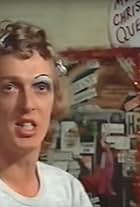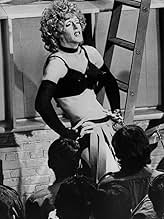Michael Greer(1943-2002)
- Actor
- Casting Director
- Additional Crew
Michael Greer was an actor and comedian. His most famous role was as
Queenie, the prison drag queen in Sal Mineo's stage and the Harvey Hart
film versions of "Fortune and Men's Eyes" (Fortune and Men's Eyes (1971)), which dealt with
sex in prison. Mr. Greer appeared as Don Johnson's friend in the 1960s cult
film The Magic Garden of Stanley Sweetheart (1970). That movie was also Don Johnson's big screen debut. Other
credits include the B-Movie sex comedy Summer School Teachers (1975) and The Gay Deceivers (1969) about two
guys avoiding combat in Vietnam by pretending to be gay. He also had
bit parts in the Steve Martin comedy The Lonely Guy (1984) and the Bette Midler vehicle The Rose (1979)
Michael was also famous for his live performances as a comedian. Of particular note was a monologue, as the Mona Lisa, holding a giant gilded frame around himself.
He wrote supplemental material for Debbie Reynolds Vegas act, and was once called in to dub Bette Davis' voice when she refused to loop over scenes.
Greer was somewhat a victim of early "gaysploitation" films. A talented actor, it never occurred to him that once he had turned in solid performances as designated that he would not be allowed to work as much else, partially because no one had done it before.
He is not acknowledged much in gay cinema because of a climate of political correctness. He is probably more accurately remembered by friends, colleagues, and punters that saw his live work, than by Hollywood.
Michael was also famous for his live performances as a comedian. Of particular note was a monologue, as the Mona Lisa, holding a giant gilded frame around himself.
He wrote supplemental material for Debbie Reynolds Vegas act, and was once called in to dub Bette Davis' voice when she refused to loop over scenes.
Greer was somewhat a victim of early "gaysploitation" films. A talented actor, it never occurred to him that once he had turned in solid performances as designated that he would not be allowed to work as much else, partially because no one had done it before.
He is not acknowledged much in gay cinema because of a climate of political correctness. He is probably more accurately remembered by friends, colleagues, and punters that saw his live work, than by Hollywood.





















